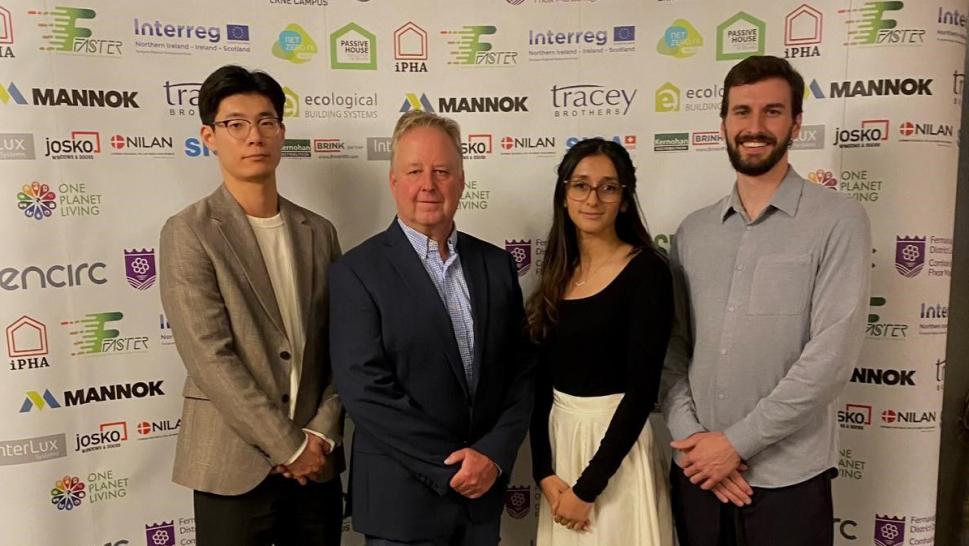
Three Humber College students and a faculty member recently travelled to South West College in Northern Ireland to attend the Building a Sustainable Future International Conference.
Kerry Johnston, professor and program coordinator with Humber’s Sustainable Energy and Building Technology program, joined students Joshua Canuel, Meriam Khan and Heesu Hong for the conference that took place at South West College’s Erne Campus in Enniskillen.
South West College was also hosting the International Passive House Association (iPHA) 2022 Camp at the same time. Passive House is a building standard for energy-efficient buildings – ones where traditional heating and cooling systems aren’t needed.
The students studied in the CREST Passive Pavilion, which is one of the most sustainable buildings in the United Kingdom that meets the Passive House, BREEAM Excellent and Carbon Neutral building standards. They also had experiential learning opportunities while at the Passive Lab at the CREST Centre and learned more about what's required to take the five Passive House principles from design and construction to testing and certification.
“Being a part of the conference has been a good learning experience for me,” said Canuel, who’s enrolled in Humber’s Sustainable Energy and Building Technology program. “Seeing the previous generations setting up a map for the younger generations to follow and reduce our energy usage is invigorating and makes me hopeful for our energy usage in the future and our climate.”

The Erne Campus recently was named UK Project of the Year by the Royal Institution of Chartered Surveyors and its website boasts that it’s the first educational building worldwide to achieve the highest international standard in environmental construction – PassivHaus Premium.
“It was extremely beneficial for the students to have that international networking experience and to also see the type of construction that we hope will be the model for all the new buildings we build in the future,” said Johnston, adding the students gained a better understanding of the Passive House program through the experience.
Johnston noted that Humber’s NX Building, which has already been recognized as one of the most energy-efficient buildings in North America according to the Association of Consulting Engineering Companies Canada, has Passive House certification.
The opportunity for the Humber representatives to travel to Northern Ireland was funded by Global Skills Opportunity, the Government of Canada’s Outbound Student Mobility Program.
Johnston said that one of the benefits for students was that they heard the perspective of those from other countries such as Turkey, Greece and Australia, and how their populations, climate conditions and access to energy impact their construction industries.
“North America is kind of unique as it relates to buildings and energy systems,” said Johnston. “We’ve had this abundance of cheap, readily available fossil fuels for the last 150 years or so. The students were able to contrast our country with other countries and saw how we’re different because we’re such big consumers of energy and water. It was an opportunity to understand how other countries approach the relationship between buildings and energy and natural resources.”
Earlier this year, South West College sent three faculty members to Humber’s Global Summer School to co-teach the Optimizing High Performance Building Design course, with support through the Turing Scheme, the U.K.’s global program for studying, working and living abroad. As a result of the successful collaboration, South West invited Humber faculty and students to attend the conference.
“National funding mechanisms such as Canada’s Global Skills Opportunity and the U.K.’s Turing Scheme open doors for global partnership,” said Rebecca Fitzgerald, associate dean, Global Education and Partnerships at Humber. “Student mobility projects empower students, especially underrepresented students, to take advantage of invaluable global learning experiences and to develop skills such as adaptability, systems thinking, problem solving, and intercultural competency.”
Find out more at Humber’s Global Opportunities website.